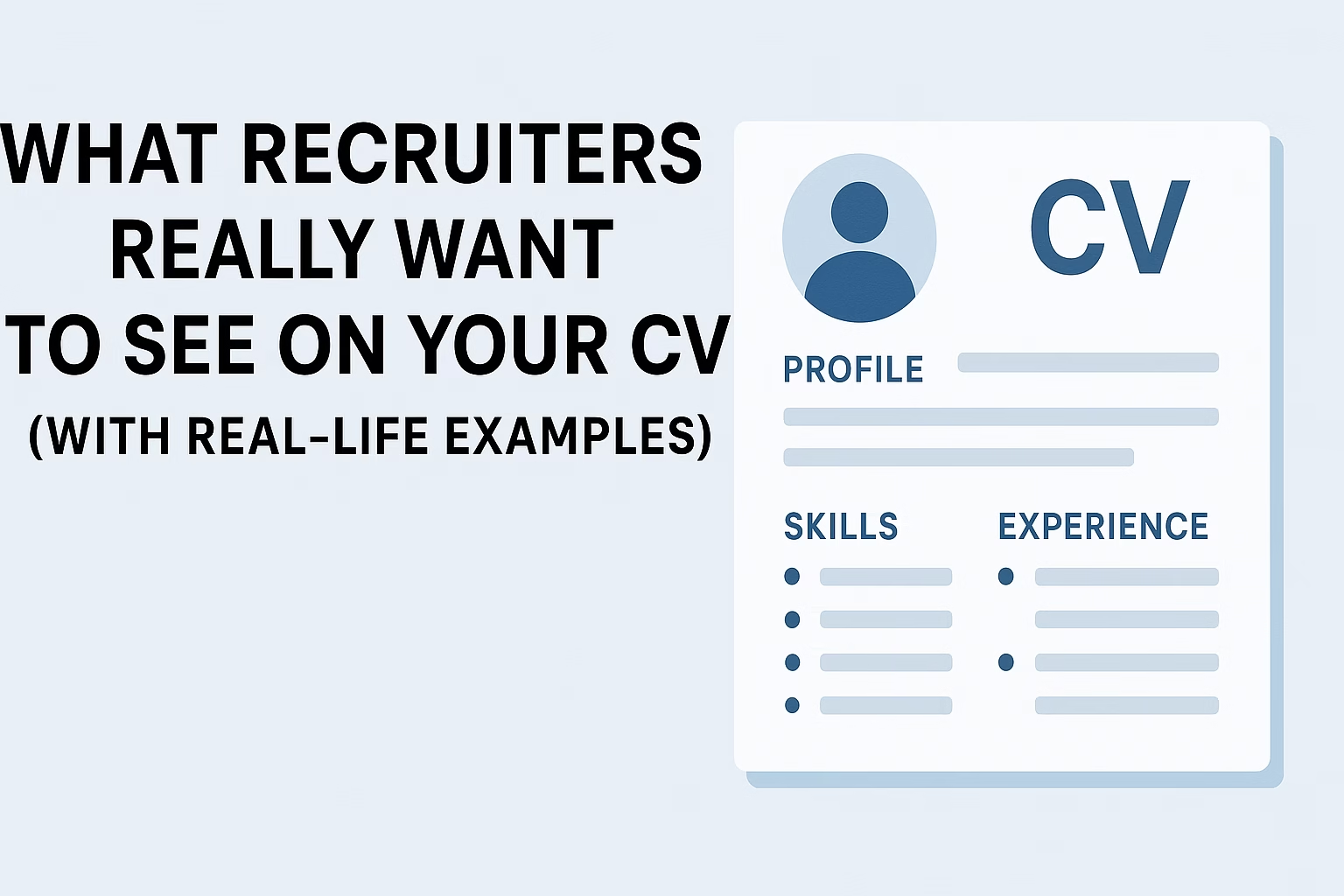
When it comes to landing your dream job, your CV (Curriculum Vitae) is your first impression. But what exactly are recruiters looking for when they scan through hundreds of applications? In this blog post, we’ll break down the key elements that recruiters really want to see on your CV, with real-life examples, SEO-optimized tips, and actionable advice to help you stand out.
Whether you’re a fresh graduate, career changer, or seasoned professional, this guide will help you structure a CV that grabs attention and gets results.
Why Does Your CV Matter So Much?
In today’s competitive job market, recruiters often spend less than 10 seconds scanning each CV. If your CV doesn’t immediately demonstrate relevance, you might be skipped — even if you’re fully qualified.
That’s why understanding what recruiters prioritize is essential to creating a CV that speaks their language.
1. A Clear and Professional Layout
What recruiters want: A CV that is clean, easy to read, and organized logically.
Why it matters: A cluttered or confusing CV will be discarded quickly, even if you have the right skills.
Real-life example:
Sara, a marketing graduate, submitted a colorful, overly designed CV with multiple fonts and graphics. Despite having internships at top agencies, she received no calls. When she simplified her CV with a clean layout, bold section headings, and bullet points, her callback rate increased by 300%.
Tips:
- Use a standard, readable font like Arial or Calibri (size 10–12).
- Stick to reverse chronological format.
- Keep it within 1–2 pages.
- Use clear section headers: Summary, Skills, Experience, Education.
2. A Strong Professional Summary
What recruiters want: A 2–4 line career summary that explains who you are, what you bring, and your career goals.
Why it matters: This section helps recruiters quickly understand your background without reading the entire CV.
Real-life example:
“Detail-oriented finance graduate with 2 years of internship experience in data analysis and reporting. Proven ability to work with large data sets using Excel and Power BI. Seeking an entry-level analyst role in a fast-paced financial services firm.”
SEO Tip: Use keywords related to your target role (e.g., “data analysis,” “Power BI,” “finance graduate”).
3. Quantified Achievements in Work Experience
What recruiters want: Not just your responsibilities, but specific accomplishments with numbers that show your impact.
Why it matters: Recruiters want to hire people who get results — not just people who “did the job.”
Real-life example:
John, a sales executive, improved his CV by changing this:
❌ “Responsible for managing sales team.”
✅ “Managed a team of 5 and increased monthly sales by 25% within 6 months.”
Tips:
- Use the STAR method (Situation, Task, Action, Result).
- Include percentages, figures, or timeframes.
- Start each bullet point with a strong action verb (e.g., increased, led, developed, reduced).
4. Relevant Skills with Keywords
What recruiters want: A list of relevant, job-specific skills, not generic fluff.
Why it matters: Many companies use Applicant Tracking Systems (ATS) to filter CVs based on keywords.
Real-life example:
Anisha, a UX designer, failed to get interviews until she tailored her CV with keywords from job descriptions like “Figma,” “Wireframing,” and “User Research.”
Tips:
- Create a “Key Skills” section with 8–10 bullet points.
- Use tools like Jobscan to analyze keywords.
- Include both hard skills (e.g., Python, Excel, SEO) and soft skills (e.g., teamwork, leadership).
5. Education and Certifications
What recruiters want: Clear academic history and any certifications relevant to the role.
Why it matters: For freshers and career switchers, education can be your strongest asset.
Real-life example:
Ali, a recent graduate with a low CGPA (2.43/4), focused on certifications in digital marketing from Google and HubSpot. His CV caught recruiter attention because he showed initiative beyond academics.
Tips:
- List degrees in reverse chronological order.
- Mention online certifications (Coursera, Udemy, etc.).
- Include thesis projects or relevant coursework if you lack experience.
6. Tailored Content for the Job
What recruiters want: A CV that feels personalized for the role and company.
Why it matters: Generic CVs get ignored. Custom CVs show effort and alignment.
Real-life example:
Carlos applied for a content writer role with a tailored CV that mirrored the company’s tone and mentioned their blog by name. He was hired within two weeks.
Tips:
- Match your CV tone to the company’s culture.
- Highlight experience and skills relevant to the job description.
- Use the company’s name in your summary (sparingly and appropriately).
7. No Red Flags or Irrelevant Info
What recruiters avoid:
- Typos or grammatical errors
- Unexplained gaps in employment
- Outdated or irrelevant jobs (e.g., “Newspaper delivery, 2009”)
Real-life example:
Reema had a 2-year gap after graduation. Instead of hiding it, she added: “Took a career break to care for a family member while completing online certifications in HR Management.” Recruiters appreciated the honesty and her initiative.
Tips:
- Be honest, but brief, about career gaps.
- Remove outdated skills (like MS-DOS or fax machine handling).
- Don’t include personal details like marital status or photo (unless required in your country).
Final CV Checklist for Job Seekers
Before submitting your CV, ask yourself:
✅ Is it visually clean and well-organized?
✅ Does it include measurable results?
✅ Are keywords from the job description included?
✅ Is it tailored for the specific job or company?
✅ Did I proofread for errors?
Final Thoughts
Recruiters aren’t looking for perfection — they’re looking for clarity, value, and potential. Your CV should tell a story: not just where you’ve been, but where you’re going.
By focusing on relevance, results, and readability, you can dramatically increase your chances of landing an interview.
Keywords Recap:
- What recruiters want on your CV
- How to write a professional CV
- CV tips for job seekers
- CV examples with achievements
- Best CV layout for 2025
- How to pass applicant tracking systems
- Real CV examples
- How to write a career summary
If you found this blog helpful, share it with someone looking for a job or drop your CV questions in the comments below!
